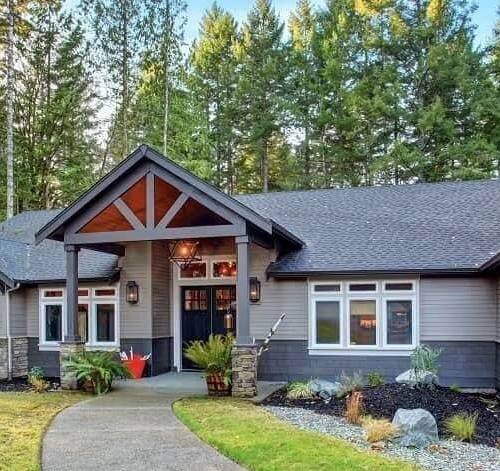Assessed value vs. market value: Your questions answered
Feb 29, 2024
•5-minute read
Preparing to purchase a home can be an exciting time. After all, you’re setting up the next chapter of your life.
By now, you’ve probably encountered plenty of real estate jargon – like assessed value versus market value, and what’s the difference? In short, assessed value is the home’s value come tax time while fair market value is the cost to buy a home in that area.
Let’s take a closer look at what you’ll need to know about the differences between assessed value and market value when buying or selling a home.
What’s the difference between assessed value and market value?
| Assessed value | Market value |
|---|---|
|
Assigned by a local government for property tax purposes |
The price a buyer and seller would agree upon in an open and competitive real estate market |
|
Determined by local tax assessors |
Determined by appraisers |
|
Determined based on factors like location, size, condition and other relevant criteria assessed by the government |
Determined by factors such as recent sales of comparable properties, property condition, and home size |
|
Used to determine the amount of property taxes owed |
Fluctuates based on the local market, the economy and other property features or upgrades |
When market value matters and how it’s calculated
The market value of a home is often referred to as the fair market value. Whether you’re buying a house or selling a house, this is a critical number. Essentially, the market value determines how much a home will cost.
How is fair market value determined?
When determining the fair market value of the property, real estate comps and appraisals play a role in setting the price. Typically, a rough estimate can be determined based on the square footage in relation to similar properties in the area. Plus, a professional appraiser can provide a somewhat accurate estimate.
However, these numbers will only get you so far. Ultimately, the fair market value is determined by how much a buyer is willing to pay for a property.
When tax assessed value matters and how it’s calculated
The assessed value serves a different purpose. Specifically, the assessed value is used to calculate property taxes.
As a buyer, the assessed value gives you an idea of what you can expect to pay in property taxes each year. Before you make an offer on any property, you should factor the expected annual property taxes into your budget. If you can’t afford the taxes on a property based on its assessed value, it’s important to know this before diving in headfirst.
Of course, it’s likely the property taxes on the home won’t make or break your decision. But it’s still a good idea to consider all the costs before settling into homeownership.
The property tax rate will vary widely based on your location. For example, according to data from WalletHub, the average U.S. homeowner will pay $2,375 per year in property taxes. But New Jersey residents will pay a median amount of $8,362 in property taxes annually. The assessed value of the home determines how much your property tax bill is each year.
It’s important to note that oftentimes the tax assessed value doesn’t match the market value of the home.
How Is Home Assessed Value Determined?
The assessed value of a home can have a major impact on your budget. So, how does an assessor arrive at this important number?
Typically, an assessor will look at several factors, including:
- Comparable homes: This involves comparing the value of houses – in the same area – of a similar size and with similar features.
- Recent improvements: A kitchen renovation, bathroom remodel or major addition will likely increase the value of a home.
- Rebuilding costs: The estimated cost of rebuilding a house will affect the assessed property value.
In most cases, property value assessments are conducted using mass appraisal techniques with the help of automated computer programs. After all, assessors often have many properties to consider.
However, assessors will often use the computerized assessment as a starting point. The assessor may adjust the determined assessed value based on the specifics of the home in question.
For example, let’s say an assessor is determining the assessed value of a single-family home with three bedrooms and two bathrooms. Comparable homes in the area are selling for anywhere in the $190,000 – $215,000 range. However, the property in question recently underwent a major renovation to update the kitchen and bathrooms. With that, the assessor will likely determine that the property has a higher-than-average value.
Tax assessed value vs. market value FAQs
You now know the basic definitions of assessed value versus market value. But it’s understandable if you still have a few questions about the distinction. Let’s take a minute to answer some of the most frequently asked questions.
Is an assessment the same as an appraisal?
An assessment isn’t the same as a traditional property appraisal. Instead, it’s a specific type of appraisal that can only be used for tax purposes.
A lender won’t accept a tax assessment in place of a conventional property appraisal. If you’re buying or refinancing a home, you’ll need to order a property appraisal – different from the tax assessment.
Lenders will require a conventional appraisal because of the methodology differences. With a conventional property appraisal, the lender will receive a better approximation of the fair market value that helps determine how much a borrower can receive to close on the property.
Do market value and assessed value influence each other?
When considering the assessed value versus market value, it’s important to realize that these two numbers are often connected. Throughout the home sale process, it’s not uncommon for REALTORS® to point out the assessed value to market a home. On the flip side, assessors will often take the market value into consideration.
For example, let’s consider a home that’s recently undergone a kitchen renovation. With that, the market value would likely increase to reflect the upgrades. In addition, the assessed value will likely increase as well based on increased market value.
How often do assessed values change?
The assessed value of a property can change frequently. However, the frequency will depend on the state and local laws that affect the property.
For example, a reassessment of a property’s value may only be required once every 5 years or as often as once per year. An upcoming reassessment could alter the assessed value to a more appropriate level.
Can taxpayers dispute assessed values?
As a taxpayer, you can absolutely dispute the assessed value. If you want to dispute the assessed value of your home, consider reaching out to your local tax collectors’ office. They should be able to provide directions for your request.
The bottom line: For home buyers, market value matters most
The assessed value of a home is critical for tax purposes. But ultimately, a variety of other factors will determine the fair market value of a home.
As you consider home options, realize that the assessed value and tax rate can change regularly. And with those changes, you’ll be required to pay a variable tax bill each year.
A more significant factor that will permanently affect the monthly expenses surrounding your mortgage is the mortgage interest rate. With that, getting the best possible interest rate will continue to benefit you for the full life of your home’s loan.
Ready to explore your mortgage options? Start the mortgage process today.

Sarah Sharkey
Sarah Sharkey is a personal finance writer who enjoys helping readers make informed financial decisions. She lives in Florida with her husband and dogs. When she's not writing, she's outside exploring the coast.
Related resources

5-minute read
Appraised value vs. market value: Knowing the difference
Knowing the difference between appraised value vs. market value is key when purchasing a home. Learn more about the role each plays in real estate transactio...
Read more
5-minute read
How to increase your house value
Upgrading parts of your home is a great way to increase its value. Here are 9 tips about how to get started and finance your renovation projects.
Read more
2-minute read
How long does mortgage preapproval last?
How long a mortgage preapproval lasts will depend on the lender, but it’s usually 60 – 90 days. Uncover more about how long mortgage preapprovals la...
Read more